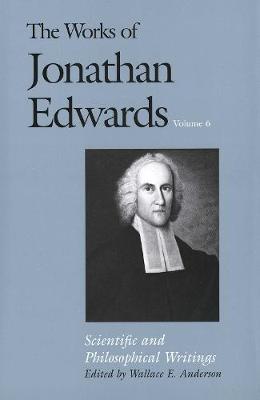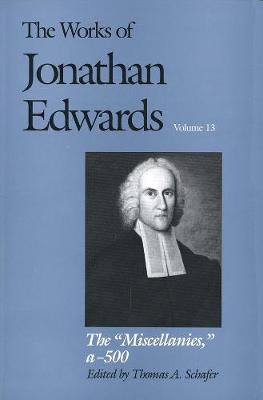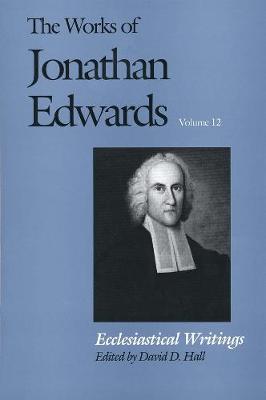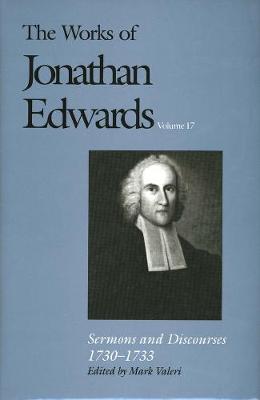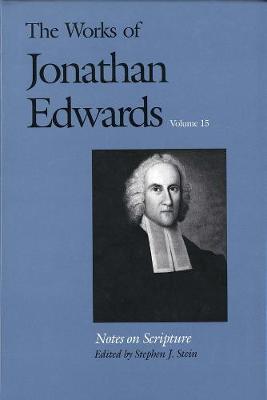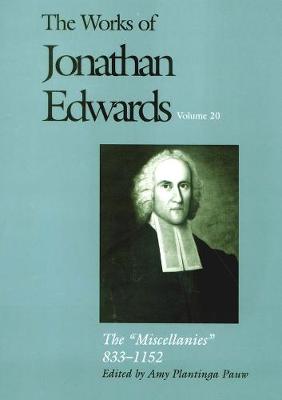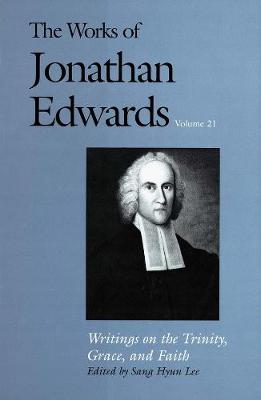The Works of Jonathan Edwards
27 total works
This volume contains two major manuscript notebooks of Jonathan Edwards-"Natural Philosophy" and "The Mind"-as well as a number of shorter manuscript writings connected with his scientific interests and philosophical development. Several of the shorter papers have not previously been published, notably Edwards' letter on the "flying" spider (hither known only in a draft version), an essay on light rays, and a brief but important set of philosophical notes written near the end of his life. Wherever possible the works have been newly transcribed from manuscript originals. Wallace Anderson has collected, edited, and presented them here in a thoroughly authentic and readable text.
Each of the major works in this volume and each group of related writings are preceded by detailed discussion of manuscript sources and dates. In his introduction Anderson makes these the basis for a revised account of the chronology of Edwards' early writings and a deeper investigation of their biographical and historical context. Also included in the introduction are a new appraisal of Edwards' efforts and achievements in science and an analysis of the developmental of his philosophical views. Anderson concludes from his research that Edwards was an enthusiastic, though untrained, investigator in the Newtonian tradition and that he grappled with the major metaphysical problems raised by this tradition. The papers reveal with special clarity the fertile and inquiring mind of our leading eighteenth-century philosopher-theologian.
Wallace E. Anderson is associate professor of philosophy at Ohio State University.
Each of the major works in this volume and each group of related writings are preceded by detailed discussion of manuscript sources and dates. In his introduction Anderson makes these the basis for a revised account of the chronology of Edwards' early writings and a deeper investigation of their biographical and historical context. Also included in the introduction are a new appraisal of Edwards' efforts and achievements in science and an analysis of the developmental of his philosophical views. Anderson concludes from his research that Edwards was an enthusiastic, though untrained, investigator in the Newtonian tradition and that he grappled with the major metaphysical problems raised by this tradition. The papers reveal with special clarity the fertile and inquiring mind of our leading eighteenth-century philosopher-theologian.
Wallace E. Anderson is associate professor of philosophy at Ohio State University.
This book begins the publication of Jonathan Edwards's personal theological notebooks, called collectively the "Miscellanies." The entries in Volume 13 span the early years of Edwards's ministry, (1722-1731) and range widely in subject matter. They record Edwards's initial thoughts on some of his most characteristic ideas, such as original sin, free will, the Trinity and God's end in creation. However, many entries relate to doctrinal and polemical subjects not included in the corpus of Edwards's published writings. The volume also contains Edwards's own alphabetical index to the entire "Miscellanies"; this "Table" is a theological document in its own right that reveals the interrelationship among the various components of Edwards's theological system.
The editor's introduction includes an interpretive essay that relates Edwards's growing body of entries in the "Miscellanies" to the main events in his life and progressing career. It also explores how even before the beginning of his tutorship at Yale in 1724 Edwards had developed both within and outside of the "Miscellanies" certain fundamental positions that constitute the truly distinctive elements in his theology. The introduction ends with an explanation of the methodology used to establish for the first time the chronology of the early miscellanies. The conclusions of this research are summarized in a comprehensive chronological chart that locates by date not only entry nos. a-500, but also the sermons, essays and other manuscripts Edwards composed prior to 1731.
The editor's introduction includes an interpretive essay that relates Edwards's growing body of entries in the "Miscellanies" to the main events in his life and progressing career. It also explores how even before the beginning of his tutorship at Yale in 1724 Edwards had developed both within and outside of the "Miscellanies" certain fundamental positions that constitute the truly distinctive elements in his theology. The introduction ends with an explanation of the methodology used to establish for the first time the chronology of the early miscellanies. The conclusions of this research are summarized in a comprehensive chronological chart that locates by date not only entry nos. a-500, but also the sermons, essays and other manuscripts Edwards composed prior to 1731.
This volume includes four documents by Jonathan Edwards on the nature of the church, documents that reveal his views on ecclesiology, congregational autonomy, ordination, and admission to church membership and to the sacraments. The first document, reprinted here for the first time since the eighteenth century, is Edwards' defense of his fellow Hampshire County ministers in the Robert Breck controversy of 1735-36. The other three documents relate to Edwards' efforts to restrict admission to the sacraments at Northampton in 1749-50, actions that ultimately led to his dismissal as pastor: An Humble Inquiry explicates his reasons for refuting his grandfather and predecessor Solomon Stoddard's open admission policy; Misrepresentations Corrected is Edwards' response to his cousin Solomon Williams' criticisms of the Humble Inquiry; and Edwards' untitled narrative, available before only in Sereno Dwight's 1829 edition and here newly re-edited, gives details of his final conflict with his Northampton congregation.
The general introduction by David D. Hall places these writings in their contemporary polemical contexts and locates Edwards in a historical framework that highlights his Puritan, Congregational heritage and the tensions between lay and clerical piety. It also provides an important reassessment of Edwards' relationship to Stoddard in the light of Edwards' experience during and after the Great Awakening.
The general introduction by David D. Hall places these writings in their contemporary polemical contexts and locates Edwards in a historical framework that highlights his Puritan, Congregational heritage and the tensions between lay and clerical piety. It also provides an important reassessment of Edwards' relationship to Stoddard in the light of Edwards' experience during and after the Great Awakening.
In his new role as pastor of the Northampton church, Jonathan Edwards turned his attention to the political, social, and economic activities of his congregation, shaping his preaching to the day-to-day occurrences in their lives. This volume contains eighteen sermons that Edwards composed in Northampton from the beginning of 1730 through mid-September 1733-such classics as God Glorified in Man's Dependence and A Divine and Supernatural Light, along with many previously unpublished works. The selections illuminate Edwards' development as a preacher and theologian. They also provide unique insights into the development of the themes that came to characterize his mature evangelical thinking: the viciousness of the unregenerate life, the importance of evangelical humiliation as a religious exercise, and the necessity of a radical conversion from worldliness to godliness.
The prolific period encompassed by this volume, though outwardly quiet, was crucial to Edwards' maturation. Taking on the responsibilities of his calling-working with his congregation, finding his voice as a town religious leader, exercising moral and spiritual guidance, consulting with other pastors, and most of all developing a mature preaching style-Edwards came to see revival as the only solution to the social and moral ills of his time.
The prolific period encompassed by this volume, though outwardly quiet, was crucial to Edwards' maturation. Taking on the responsibilities of his calling-working with his congregation, finding his voice as a town religious leader, exercising moral and spiritual guidance, consulting with other pastors, and most of all developing a mature preaching style-Edwards came to see revival as the only solution to the social and moral ills of his time.
This is the first complete edition of the private biblical notebook that Jonathan Edwards compiled over a period of nearly thirty-five years. Edwards’ "Notes on Scripture" confirms the centrality of the Bible in his thought and provides more balance to earlier depictions of his writings that emphasized the scientific and philosophical while overlooking the biblical dimension. In this critical edition the entries appear in the order in which Edwards wrote them, beginning with a short commentary on Genesis 2:10-14 that he penned in 1724, and ending with his last entry, Number 507 on the Book of Solomon's Song, written two years before his death.
This volume provides direct access to one of America’s most influential religious thinkers. Edwards’ entries range across the entire scriptural canon and reveal his creativity in the interpretation of particular biblical texts and his fascination with typology. The notebook also documents Edwards’ engagement with the intellectual currents of his day, in particular his response to the challenge associated with the Enlightenment critique of biblical revelation. Stephen J. Stein’s introduction situates Edwards as an exegete in the larger tradition of biblical commentary and in the intellectual world of eighteenth-century Western thought.
This volume provides direct access to one of America’s most influential religious thinkers. Edwards’ entries range across the entire scriptural canon and reveal his creativity in the interpretation of particular biblical texts and his fascination with typology. The notebook also documents Edwards’ engagement with the intellectual currents of his day, in particular his response to the challenge associated with the Enlightenment critique of biblical revelation. Stephen J. Stein’s introduction situates Edwards as an exegete in the larger tradition of biblical commentary and in the intellectual world of eighteenth-century Western thought.
Throughout his adult life Jonathan Edwards kept a series of personal theological notebooks on a wide variety of miscellaneous subjects. This volume includes the notebook entries written during the eventful and tumultuous years 1740-1751, when Edwards was plagued by a series of bitter controversies with his Northampton congregation that culminated in his dismissal. This was also the period during which he witnessed, documented, and pondered the surprising revivals of the Great Awakening, as well as their precipitous decline.
In this collection of writings drawn from Jonathan Edwards's essays and topical notebooks, the great American theologian deals with key Christian doctrines including the Trinity, grace, and faith. The volume includes long-established pieces in the Edwards canon, newly reedited from the original manuscripts, as well as documents that have never before been published and that in some cases reveal new aspects of his theology.
